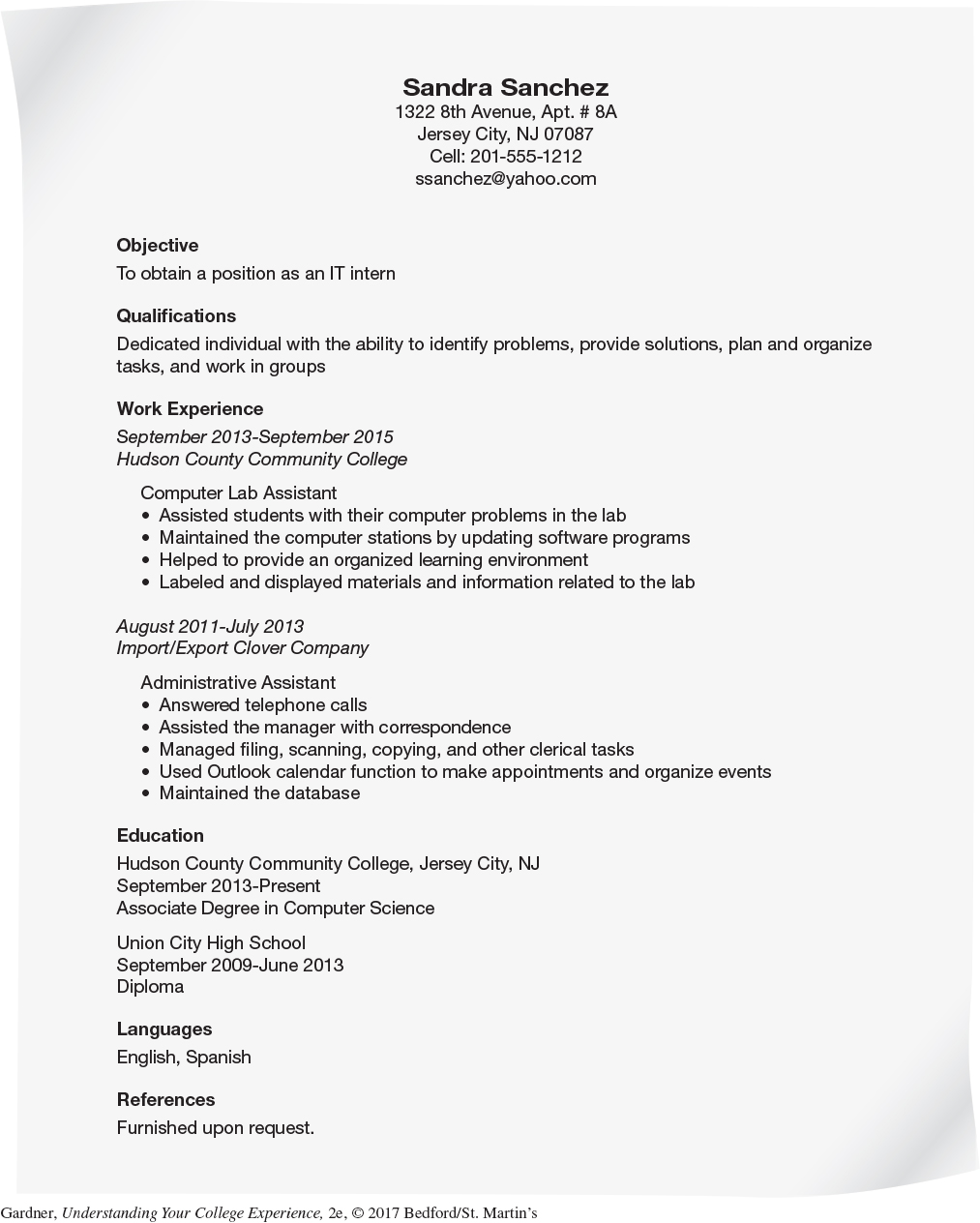12.5 JOB SEARCH STRATEGIES
To find a job while you are in college or after you graduate, you can apply the following job search strategies:
Learn the names of the major employers in your college’s geographic area: manufacturers, service industries, resorts, and so on. Once you know who the major employers are, check them out or visit their websites. If you like what you see, visit your career center to arrange an informational interview or job-shadowing opportunity.
Check online postings and classified ads in the local newspaper, either in print or online.
Check your college’s student newspaper. Employers who favor hiring college students often advertise their businesses. Some companies also have programs that enable students to earn online degrees while working. Be cautious about work opportunities that seem unrealistic, such as those offering big salaries for working at home or those that ask you to pay an up-front fee for a job. When in doubt, ask your career center for advice.
Be aware that many job openings are never posted. Employers usually prefer to hire people who are recommended to them by current employees, friends, or the person leaving the position. Realize that who you know is important. Your friends who already work on campus or who have had an internship can be the best people to help you when you are ready to search for your job.
Market Yourself
You might think that marketing yourself is what you do when you need a job, but in fact that’s not the case at all. Marketing yourself is actually about developing a presence at your college and within your industry. If you can create a name and reputation for yourself, you can shape your own future. You need to stand out from your peers if you want to go far in your career. Think carefully about what you can do outside the classroom, such as becoming a co-op student, an intern, or a volunteer. Taking control of your own image is your responsibility. There is no one who can portray you as accurately as you can portray yourself. Remember to share your career goals with instructors, advisers, friends, and family; they can’t help market you if they don’t know you! The more others know about your professional goals, the more they are able to help you make professional connections.
YOUR TURN > WORK TOGETHER

Discuss with your classmates what strategies you could use to market yourself to a potential employer. Which of your characteristics or aptitudes would you emphasize? What do your peers plan to do to market themselves?
Build a Résumé
A good résumé is an excellent and necessary way of marketing yourself. Before you finish college, you’ll need a résumé, whether it’s for a part-time job, an internship, or a co-op position. You will also need to show a résumé to an instructor who agrees to write you a letter of recommendation. There are two résumé formats: chronological and skill focused. Figure 12.1 shows a chronological résumé. You can choose the chronological format to list your jobs and other experiences from the most to least recent. Choose the skills résumé if you can group skills from a number of jobs or projects under several meaningful categories. Your career center can help you choose the format that is right for you based on your experience and future goals.

The average time an employer spends screening résumés for the first time is 7 to 10 seconds. Many employers also use résumé-scanning software to identify key terms and experiences of the applicants who are most important to the employer. If you are a new professional, a one-page résumé is appropriate. Add a second page only if you have truly outstanding skills or work experiences that won’t fit on the first page, but consult with your career center for guidance on this point. If you are in college to get retrained and change your career, make sure to update your information on your résumé.
Write a Cover Letter
A cover letter is more important than a résumé and much harder to write well. When sending a cover letter, think about who will receive it. Different fields will have different requirements. Your academic adviser or career counselor can help you address your letter to the right person, and so can the Internet. Never write, “To whom it may concern.” Use the proper formats for date, address, and salutation (Dear _____:). These are details that employers pay attention to, and a mistake in your letter may cost you an interview. Most important of all is to present a letter that is grammatically correct and free of errors. Make sure to ask someone whose writing ability you trust to proofread your cover letter, or better yet, take it to your college’s learning center.
A cover letter, written to explain how hiring you will benefit the organization, is an excellent way of marketing yourself to a potential employer. It is important to review the organization’s website and find out what skills and experience its employees have. Use the cover letter to highlight your skills for every requirement of the position. Your career center can help you write a cover letter that talks about your education and your experience related to the position. Spending time on writing an excellent cover letter also prepares you for the interview by allowing you to think about how your background matches the needs of that position and the organization.
Interview
The first year of college might not seem like a time to be concerned about interviews. However, students often find themselves in interview situations soon after arriving on campus, sometimes online through Skype, Zoom, Adobe Connect, imo, or other digital conferencing products. You might be looking for positions in student government, finding an on-campus job, competing for a second-year scholarship, choosing a summer job opportunity, or applying for an internship. Preparing for an interview begins the moment you arrive on campus because, as a first-year student, the interview will be about you and how college is changing you. Luckily, the chapters in this book have begun preparing you for the interview process.
The purpose of the interview is to exchange information; the goal is to assess your abilities and competencies. For you, the interview is an opportunity to learn more about the employer and whether the position would be a good fit with your abilities and preferences. Ideally, you want to find a match between your interests and abilities and the position or experience you are seeking. It is important to research the organization and the people you may be working with prior to any interview. Doing so will help prepare you for the interview and help you know what questions to ask. The following explains how you can go about doing this research:
Start with the company website. This is usually the single best resource. Scroll through the entire site. Note details you can use to develop good questions to ask in your interview and prepare relevant answers to anticipated interview questions. If the company does not have its own website, go to other sites, such as Hoovers.com, which provide extensive information about companies and industries.
Page 286Ask for advice. Ask your instructor or a staff member in your college career center about the organization.
Note the employer’s goals and values. This tells you about the organizational culture. Use this information to decide whether you would be a good fit.
Research details on the employer’s products and services. Being able to talk a company’s language shows that you have prepared yourself.
Take your research with you to the interview. It is recommended that you show how you have taken the time to find out about the company prior to the interview.

After you’ve done your research, the next step is to practice interviewing before the actual interview. Check with your career center to find out whether you can participate in a mock interview. Mock interviews help students feel comfortable in real interview situations. Your counselor might ask you for a position description, your résumé, and an organization profile before the interview. Career counselors use these materials to create a situation similar to an actual interview. Many career centers also have practice interview software such as InterviewStream, which is a popular program that allows you to record answers to interview questions asked by the computer for replay and review. You can record your answers multiple times as you try to perfect your response; you can send your recorded interview to instructors or others for feedback; and because the interview is recorded using a webcam, you can review not only your words but also your body language! Nonverbal communication is often more important than what you actually say in the interview. Even if a mock interview session is not available, the career center can offer tips on handling an interview situation. Check your career center’s website for sample interview questions so that you can practice before an interview.
If you are changing your career and have some experience with interviewing, make sure to think about the best and worst interviews you have had and try to avoid repeating mistakes you made in the past; more important, build on the positive interview strategies you used in previous successful interviews.
In an interview situation, any of the following might be a deciding factor in whether you are hired for the position:
Dress appropriately. First impressions matter, so always dress neatly and appropriately. You can be somewhat casual for some types of employers, but it is better to dress too professionally than too informally. Some colleges have outfits—suits or dresses—to loan to students who cannot yet afford to buy expensive clothes for an interview.
Arrive on time to the interview. If your interview is off campus, carefully estimate how long it will take you to travel to the interview site before the day of your interview. Be mindful of traffic volume at certain times of the day, and if you are driving, make sure you know where to park. The interviewer expects you to be on time, regardless of the weather or your commuting time.
Follow up. It is important to follow up any interview with a thank-you e-mail. Many times, the person to whom you addressed your cover letter is not the person with whom you actually interview. Prior to leaving the interview, ask for business cards of the professionals you met with so that you have their contact information. Send a thank-you to every person who interviewed you. In your follow-up, you can once more highlight how your skills and experience match with the organization’s goals.